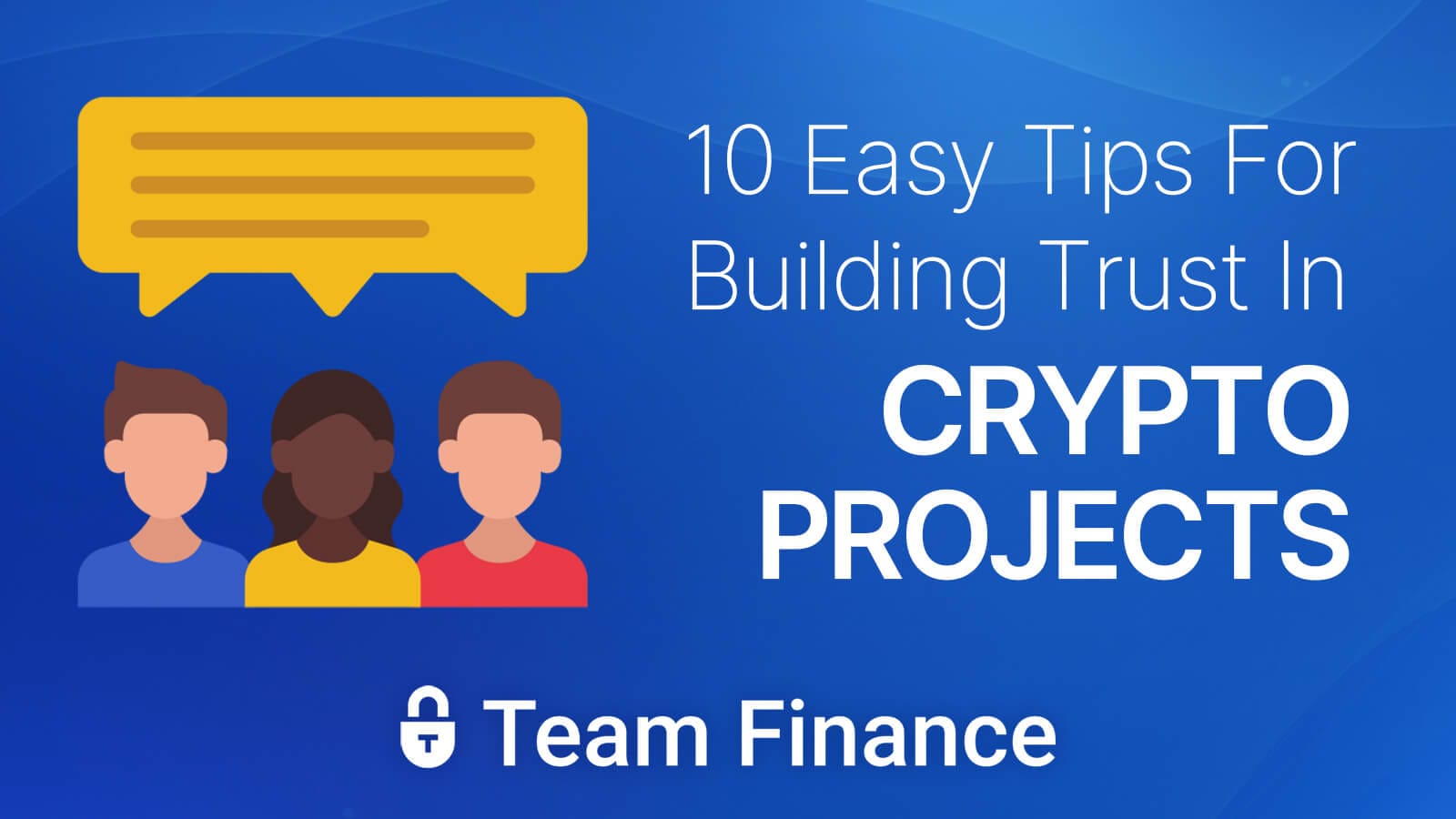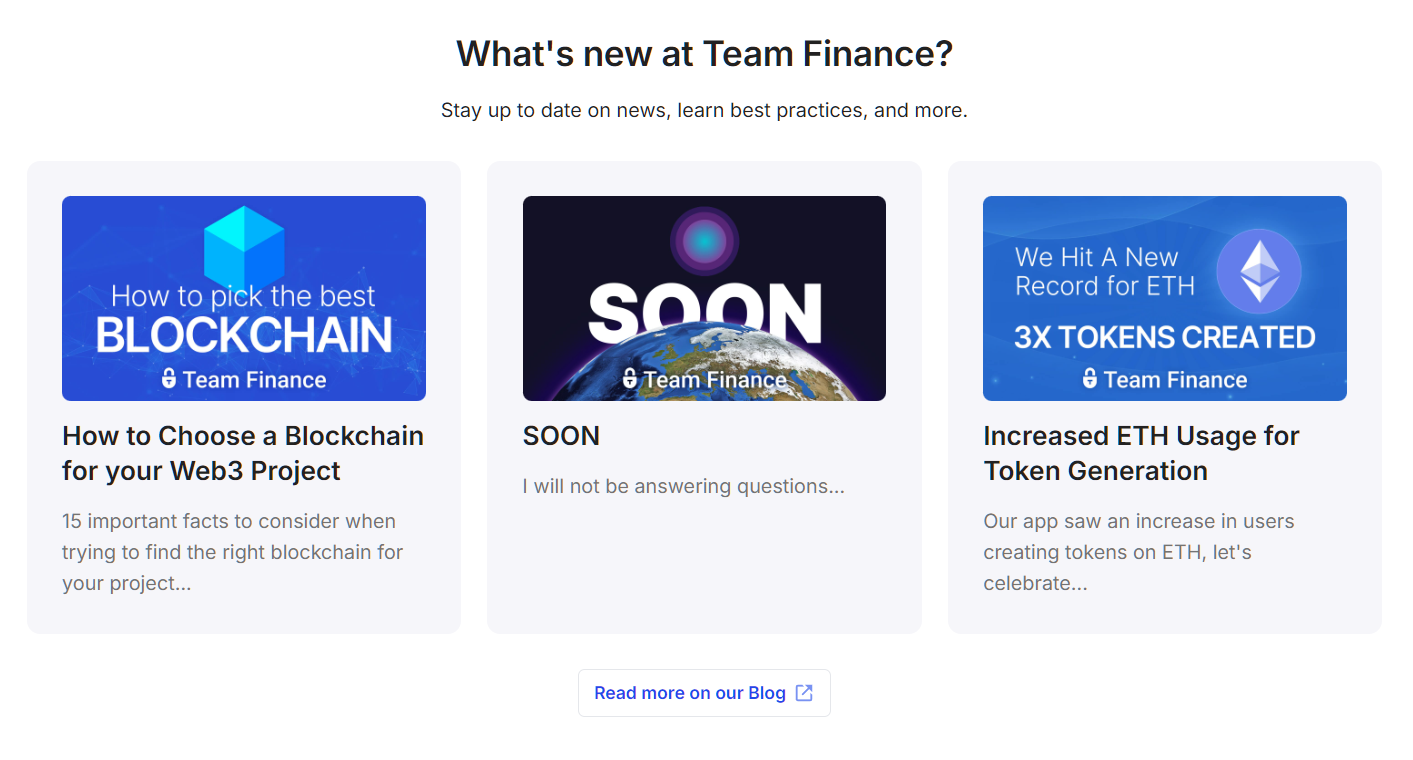10 Top Ways to Build Trust with Your Crypto Community
Created a token or started a web3 project and want to learn how to build a communities trust? We put together a handy 10 step guide...

How do you get the community to trust you and your team?
Have you struggled to improve or maintain trust in your web3 project?
We've helped over 38,000 customers with our token management services (some of them listed below), and see many of the same solutions used by successful teams.
So, we put together 10 of the best ways to create trust for crypto projects...
1. Liquidity Locks for Trust
One of the most important steps for creating trust is securing liquidity.
By locking liquidity, projects can ensure that the funds in DEXs remain secure and inaccessible for a set period. This prevents rug pulls, where bad actors drain liquidity, leaving token holders with worthless assets. This is one of our core services for a very good reason.
- Why it matters: Liquidity locks reassure your community that you can’t suddenly withdraw funds, signaling long-term commitment and reducing volatility.
As an industry leading Liquidity Lock provider, we help projects secure their funds and set themselves up for success on a daily basis. We absolutely recommend taking this first step to helping your community feel secure.
2. Why Token Vesting is Important
Token vesting schedules show your community that the project leaders and devs are committed long term.
Vesting prevents early investors and team members from immediately selling large quantities of tokens, which can flood the market and crash the token’s price. Instead, vested tokens are gradually released, ensuring stability. It's also a great way to keep advisors, team members, and communities onboard.
- Best Practice: Platforms like Team.Finance allow you to create transparent vesting schedules with automatic releases at specific intervals.
- Why it matters: Token vesting aligns your team’s incentives with the project's long term success, adding to investor confidence. It also allows you to give more ownership to what happens to a community member, investor, or employees funds - especially if they have access to their own vesting dashboard.
We've helped over 38,000 web3 projects use our services like token vesting schedules over several years. This is a great way to instantly lock in that trust.
3. Audited Smart Contracts

Having your smart contracts audited by a reputable third-party is essential for ensuring the security of your project. The same is true for token management services. An audit certifies that your code is free from vulnerabilities and provides a layer of trust for your community.
- Top Audit Firms: Consider auditing with CertiK, Hacken, or BailSec are all leaders in the field of smart contract security. We use them for very good reasons!
- Why it matters: Audited contracts help protect your project from exploits and hacks, offering assurance to investors and users that your platform is safe to use. But remember, nothing is 100% secure - so do you research and keep adding layers of security and safety. A good CTO or CSO will really help your team here.
4. Public Team Transparency
Showing your community who is behind the project is another important layer in building trust. Anonymous teams often raise red flags and can discourage investors. We've all gone to a web3 site and seen cartoon avatars or AI generated profile pics - this really turns serious investors away.
- Leaders: Successful projects like Ethereum and Cardano have well-known, transparent leadership, contributing to their widespread trust and success.
- Why it matters: Public team members provide a layer of accountability that anonymous founders cannot, reducing the risk of scams. Afterall, would you really trust a username, AI cartoon avatar, and someone who only tweets about their own coin?
5. Regular Community Updates

Open, real, and consistent communication is key to maintaining trust.
Providing frequent updates on milestones, upcoming developments, and even challenges helps to keep the community engaged and reassured of progress. Don't be afraid to admit mistakes, and be honest with how timelines are going - truth goes a long way.
- Tip: Use platforms like Twitter (must I really call it X?), Telegram, and Discord for quick updates, while longer form content can be shared on your blog (please don't use Gitdocs for this).
- Why it matters: Regular updates build transparency, create a narrative for your project, and keep your community informed about your progress. It also offers a way for communication to happen in both directions - socials work for a reason!
6. Clear Project Roadmaps Help Teams
A thorough roadmap shows your community where your project is headed and helps set realistic expectations. Seeing steady progress, coupled with regular updates shows how committed you are, and keeps revitalizing your existing audience, while attracting new members.
- Example: Make sure to regularly update your community on any milestones reached or changes to the roadmap. I can't emphasis this last one enough, keep them informed!
- Why it matters: A clear roadmap signals that your project is serious and long-term, which helps in attracting both investors and users. You'll often find this attracts like minded employees - especially if they align with your goals.
7. Governance Participation for Users
Decentralized governance gives your community a say in your project’s future.
By allowing your users to vote on key decisions, you create a sense of ownership and engagement. Creating a governance token or DAO structure can significantly boost trust.
- Tools: Platforms like Snapshot or Aragon offer simple governance tools to implement into your project.
- Why it matters: Governance participation aligns the interests of the community with the project, fostering longer loyalty and commitment.
8. Open-Source Development
Web3 projects with open-source code is a powerful way to build trust.
This style of development has stood the test of time, after all, GitHub is built around this principle. It allows the broader community to inspect, verify, and even contribute to your project. This truly shows you have nothing to hide!
- Insight: Major crypto projects like Bitcoin and Ethereum are open-source, enabling a large developer community to review and improve their code - they're clearly done this for a reason, so it's a great case study to take note of.
- Why it matters: Open-source dev allows for greater scrutiny, faster improvements, and builds confidence that the project is transparent and accountable. But, it could also reveal flaws in your work - so be prepared!
9. Partnership Announcements & Marketing
Forming strategic partnerships with well-known platforms or services in the crypto space provides 3rd party validation. By partnering with trusted names, your project gains credibility and shows that it has been vetted by other reputable players in the industry.
- Recent Example: Chainlink has formed numerous partnerships with DeFi platforms, enhancing its reputation and that of its partners. Make sure you keep doing this, month on month. Build that rep!
- Why it matters: Strategic partnerships give your project external validation and signal to your community that other credible projects trust your platform. It also improves your marketing outreach, visibility, and helps with things like SEO.
We're always looking for opportunities and hopefully make it easy for you work with us. That's why I personally know how important it is to have a FAQ or Contact page where projects can get in touch to work with us. You should absolutely do the same!
10. KYC/AML Compliance
Adding a KYC (Know Your Customer) and AML (Anti-Money Laundering) procedure reassures users that your project complies with regulations. While full decentralization may resist KYC, having a hybrid model for compliance can build trust with both retail users and institutional investors. We understand not every project can do this, especially if local restrictions apply, but it's certainly one to look into.
- Tip: KYC and AML compliance are crucial for any project involving financial transactions, as they prevent fraudulent activities and meet regulatory standards. Many times it's a legal requirement - but we of course can't comment on any legal matters.
- Why it matters: Compliance ensures your project is legally sound, protecting users from fraud and enhancing its reputation, especially when dealing with financial regulators. But you must stay on top of this, it's not a one-and-done situation.
Conclusion
Building trust in your web3 community is an ongoing process.
So many projects build a simple landing page, open up a Telegram and spam X with bots. This just simply screams scam and rug-pull.
Take note of these 10 strategies for success, they're tried and tested for a reason. If you're a genuine team, with a real coin or token behind you, you can foster a strong foundation of trust, safety, security, and a good future.
This, in turn, will being better engagement from your audience and the continued success of your project.

